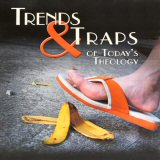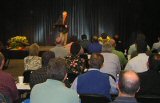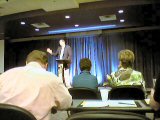 |
 |
 |
 |
 |
Is the Bible outdated? Are Christians out of touch with reality? Or is it possible that the Christian effort to reach out to culture has resulted in the abandonment of the Christian calling? This past Monday I had the privilege of attending a ministry conference at DTS; the issue on the agenda was addressing the Trends and Traps of Today’s Theology.
It was an amazing conference, and I’m more than half tempted to retype everything I learned there, just to share the experience. The conference hosted four thought provoking speakers: Dr. Jeffrey Bingham, Dept. Chair and Professor of Theological Studies at DTS; Dr. John Hannah, Distinguished Professor and teaching for over 30 years; Dr. Scott Horrell, Missionary and Professor at DTS; Dr. Glenn Kreider, Associate Professor of Theological Studies at DTS.
The conference was segmented by these four speakers into the subjects regarding: Orthodoxy and the Scriptures, Challenges to the Gospel, Pluralism and Christianity, and Issues in Eschatology.
My favorite speaker (and professor) is Jeff Bingham, however the session on contemporary challenges to the gospel by Dr. Hannah was absolutely amazing – it alone was worth the price of admission.
Dr. Hannah’s evaluation of the contemporary evangelical church is hopeful yet sobering. Through careful examination of the American church’s journey through the Enlightenment to Post-Modernism, Hannah uncovers a frightening diagnosis of the pulse to American spirituality, which reveals a wealthy and fatting organization that has traded servitude for itunes.
Here are a few observations from Dr. Hannah’s presentation, read on if you dare, for it is not a pretty picture…
Today’s culture defines reality by its market value. Unfortunately, the mantra of the post-Enlightenment church is relevancy, practicality, and contemporary – thus making the market value of our faith “excessive practicality,” which warrants rejection. Relevancy is not the great summum bonum; the great summum bonum is the person Jesus Christ.
“As a whole, Evangelicalism seems incapable of reaching into our culture with a distinctive message because we have allowed the message to fall prey to enculturation. The average fare on Sunday morning seems more concerned with demonstrating the usefulness of the Bible in the management of our personal affairs than declaring the person of the Bible, the Lord Jesus Christ.”
“Sin is now chocolate cake.”
When young believers are inquired as to the nature of the Christian faith, their explanations remain “undefined.” Thus, the data suggests that though our churches may be growing in size, they are simultaneously weakening.
Christianity [in America] has fallen to the lust of newer, bigger, practical, and attractive. The scientific revolution of the eighteenth century has given the adolescent church the lenses of corporate materialism, and we have worked to fit the “peg” Christ [and the gospel] into the “hole” of rationalism. However, by its nature, Christianity is not rationalistic; it cannot be tested by analytical proportions.
“Mystery, wonder, and awe are often lost in the business of growing American religion. We must have fallen into the rational error of thinking that numbers is the objective test of the penetration of a pagan culture.”
Therefore, through the covetousness of relevancy and management strategies, we define church growth as “effectiveness”, and numerical growth as “spiritual growth.” May it be known that Christianity has never been enamored by size until now. We have spent the past 100 years trying to become culturally relevant, still we have little to no influence upon our culture.
“I greatly fear that personality has more street value than character and the ministry verges on a personality contest.”
Sadly, the evangelical church has become self-centered. This is a result of the basic idea that the vitality of an organization is a function of personal empowerment. The disestablishment of the American church has demanded this.
Some have given up on church because their hurt removes their ability to smile, and our culture has made the strength of our spirituality equated to the length of our smile.
But…
Aside from church models and preferences, we must realize that the answer does not lie with function. The end of all things is not contemporary or traditional; the end of all things is the person you once met on a dusty road at an allegorical well outside of Sychar; how you wrap Him is secondary – it is preference.
We’ve wrapped the gospel in a rational theory. We need to know Christ, not the scriptures; but we must know the scriptures in order to know Christ. However, knowledge of the scriptures will never save you – that will never get you to heaven. “The deepest meaning of the Bible is Christ; He is the Bible’s message. The Bible’s ultimate message is not its many narratives, poetry, discourse, and history; it is the person of the Savior.”
We must take a serious look at our market strategy and not only question its effectiveness but its existence. “The church is made up of sinners, not consumers… ‘Relevancy’ is defined by the amelioration of urgent negative felt-needs and the quest for the fulfillment of immediate desires and pleasure. The trendy is temporally superficial.
While convinced that the great issues of “eternal” are too politically challenging to mention, we must in our churches articulate a worldview that has the triune God at the center and is fleshed out in a joyous countercultural life. “Do not give people something to do, give them someone in whom to believe.”
Our response is this: we must become and create “servants” not “servant-leaders.” Christ modeled servitude above all, and in that He modeled love. We must believe that it is better to be timeless than contemporary. We must believe that the Bible alone is relevant. We must enforce Christ centered theology and a love for God and love for neighbor. We must mobilize people with clarity and purpose. We must do this creatively, not culturally.
“Our treasure is the gospel, and our privilege is the proclamation of that gospel.”
